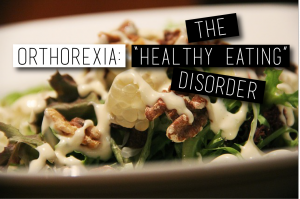Eating well is an important part of leading a healthy life. However when you become absorbed by your efforts to stay fit and balanced can lead to the development of orthorexia. You may not know what orthorexia is. No need to worry, we are about to tell you what it is and how it can affect your life.
So what is orthorexia?
Orthorexia is an eating disorder. If one does not seek treatment or therapy to counteract this eating disorder it could lead malnutrition and even death.
Individuals with orthorexia spend inordinate amounts of time thinking about and planning their meals, going to extreme lengths to avoid foods that could lead to negative effects when eaten in excess. However, even foods that contain fat and sugar are healthy to eat when eaten in moderation and the body needs both fat and sugar in order function properly. Orthorexia leads individuals to deprave their bodies of nutrition that they need in order to lead a healthy life.
It is a condition that is about what is put into the body but it stems from the mind. Low self-esteem, an extreme desire to achieve high standards of beauty, and obsessive personalities can all lead people to develop orthorexia. It differs from other eating disorders because it is not focused on the amount of food that one eats, rather the type of food that one eats.
One should seek to eat a diet that contains fruits, vegetable, and even supplements to aide weight loss such as Calotren. There are certain behaviors and healthy eating habits that one should be wary of.
- Counting your calories
You should be watching what you eat but counting your calories is not altogether necessary. As long as you are aware of the portions that you are intaking and the types of foods that you are eating you don’t need to count the calories that you eat in order to maintain a healthy, balanced diet.
- Measuring your food on a scale
Many people use scales in order to weight their food before eating a meal. This is another behavior that can lead to obsessive behavior.
- Keeping a food diary
Some keep journals that log every single thing that they eat throughout the day. You should be aware of what you are eating to avoid overeating, and sometimes those who have busy schedules keep food logs to stay organized but this is something that you should be cautious of.
- Reading food blogs frequently
Every person is different. Your age, level of fitness, height, and gender can all change the amount of food and types of food that you should be eating. Reading blogs and comparing oneself to others constantly can lead to negative consequences.
- Following an excess of healthy eating social media pages
Many of the insecurities that we face today stem from the constant connection that we now have to media thanks to technology. There are social media pages that are specifically dedicated to healthy eating. Overloading one’s mind with these images and mantras is another thing that could possibly lead to orthorexia.
- Avoiding all restaurants
When one has orthorexia they will avoid any foods that are not prepared by them because they do not have control over the ingredients that are in the food they are eating.
- Thinking of measures to improve your diet all the time
As previously mentioned, orthorexia leads to obsessive behavior and part of this is one’s mind being constantly on the food that they are eating and the effects that it has on their body.
- Making vows to cut out certain foods
If something is detrimental to your physical health then one could limit the intake of certain foods, but a person who is fixated on their diet may cut them out completely.
- Constantly researching foods
This is another trait that characterizes orthorexia or may lead to sudden weight loss. Wanting to know exactly what is in the food and how it will affect the body.
- Seeking to cut out all foods with fat and sugar
An individual with healthy eating habits will seek to manage their diet, but cutting out all foods that have fat and sugar could potentially lead to orthorexia.
References
https://www.consumerhealthdigest.com/health-conditions/orthorexia-nervosa.html
Author Bio
Willo Conner is a Health and Wellness Expert. He loves to write on a variety of topics such as joint health, weight loss, beauty and skin care for blogs and online publications sites, also loves latest technology, gadgets fashion and style. Willo also takes pleasure in riding bikes, likes to eat, especially the fresh veggies and organic food. Follow him here – Facebook, Twitter, Google+
